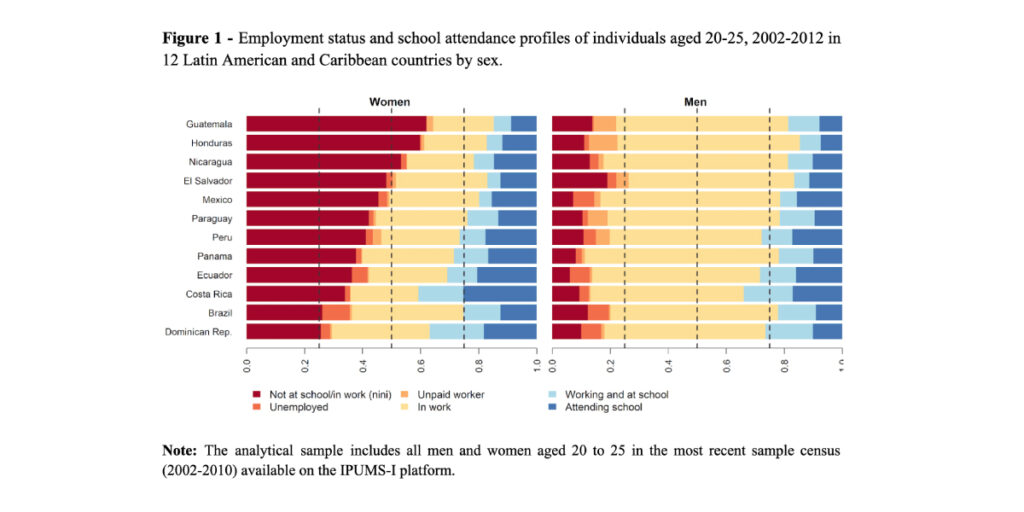Latin America faces a unique societal challenge: high numbers of young adults, especially women, who neither work nor pursue education, known colloquially as “nini.” Using census microdata for 12 countries, Chia Liu, Andrés Castro Torres, and Ewa Batyra examine the dynamics of young adults’ disengagement from public spheres (e.g., formal work and formal education) and shed light on the roles of family, gender, and social class as significant determinants of “ninihood”.
The term “nini” encapsulates the plight of young adults who find themselves disconnected from both work and education (De Hoyos, Popova, & Rogers, 2016). It’s estimated that almost 20% of youths between 15 to 25 years old in Latin America are part of this group. At the same time, early parenthood and union formation are widespread in Latin America, where many young adults, particularly women, are occupied with household and care work. To cast light on this complex socio-economic landscape, in a recently published paper, we explored the dynamics between parenthood, gender roles on one side, and labour force and formal educational participation on the other (Liu, Castro Torres & Batyra, 2023).
The “nini” phenomenon: gender and social class dynamics
In the 12 Latin American countries under study, a significant proportion of women aged 20 to 25, at least one out of every four, can be categorized as “ninis”. In Guatemala, Honduras, and Nicaragua, this proportion is even higher, above 50%. On the other hand, among men in the same age group, the percentage is notably lower, below 20% (Figure 1).

The discussion pertaining to “ninihood” is delicate. Latin America is a region with large informal labour markets, with many people working in the shadow economy, and therefore rarely captured in official data. Thus, the term is controversial because informal and uncompensated work is often left out of the picture. Despite the importance of these under-acknowledged work activities, those not engaged in formal education or the formal labour market have been found to experience high levels of insecurity. The “nini” phenomenon, essentially an early disengagement from education and work, has wide-ranging consequences, such as limited lifetime earnings, economic vulnerability and social marginalization. At the societal level, untapped human potential hampers economic growth, while unmet needs may fuel social unrest.
Given the stark differences in “ninihood” between men and women observed in Latin America (Figure 1), our study delves into the intricate relationship between early family formation, especially for women, and the accumulation of human capital. The gender and social class gradients that emerge underscore the challenges women face in remaining visible in the formal public sphere: disengagement primarily affects socially disadvantaged women, especially in Central America. Women from lower social origins who leave the parental home to enter conjugal union and parenthood at younger ages are particularly at risk. Being in a partnership increases the risk of being a “nini” for women, but reduces it for men, confirming the pervasiveness of the male breadwinner model in conjugal households.
Implications for policy and gender equality
Early family formation heightens the risk of exclusion from formal institutions and social safety nets. For those who fall into the “nini” category, transitioning into adulthood is fraught with challenges, leading to disparities in access to vital resources like unemployment insurance, healthcare, and pension schemes. Our findings emphasize the critical role of women’s engagement in the formal labour market, particularly in a context of limited social protection and single motherhood, and prompts us to reconsider how we view women’s engagement with public life, especially in the Global South.
This work on early parenthood, gender roles, and labour force participation in Latin America shines a light on the complexities behind the “nini” phenomenon. The results underscore the urgent need for governments to address the issue of disengagement from the public sphere, by improving access to employment and education, for example, especially among women and lower socio-economic classes. As Latin America strives for inclusive growth and development, acknowledging the role of early family formation and gender dynamics is essential for fostering economic security, social equality, and individual well-being.
References
De Hoyos, R., Popova, A., & Rogers, H. (2016). Out of school and out of work: A diagnostic of ninis in Latin America (Working Paper No. 7548). World Bank. Retrieved from https://openknowledge.worldbank.org/handle/10986/23723
Liu, C., Castro Torres, A. F., & Batyra, E. (2023). A gender story of social disengagement of young adults in Latin America. Sociology Compass. https://doi.org/10.1111/soc4.13138


